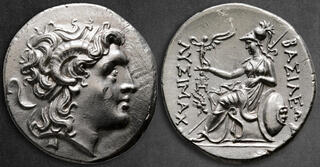| Savoca Numismatik GmbH & Co. KG > Online Auction 187 | Silver | Auction date: 10 December 2023 |
| Lot number: 24 Price realized: 1,400 EUR (Approx. 1,510 USD) Note: Prices do not include buyer's fees. | Show similar lots on CoinArchives Find similar lots in upcoming auctions on |
| Lot description: Kings of Thrace. Ainos. Macedonian. Lysimachos 305-281 BC. Struck circa 305-281 BC Tetradrachm AR 31 mm, 16,79 g Diademed head of deified Alexander right, with horn of Ammon / BAΣIΛEΩ[Σ] ΛYΣIMAX[OY], Athena Nikephoros seated to left on throne, leaning her left elbow on her shield decorated with lion's head and holding Nike, crowning the king's name, in her right; enthroned cult image before; goat's head before knee to right. Extremely Fine Mueller 116. Lysimachus, born around 361/360 BC in Pella, was a military commander under Alexander the Great and one of his Diadochi. He became King of Thrace in 306/5 BC and later King of Macedonia in 285/4 BC. Lysimachus, a Thessalian by birth, accompanied Alexander on his conquests in Asia, eventually becoming part of the young king's elite guard. After Alexander's death in 323 BC, Lysimachus received the Satrapy of Thrace from Perdiccas, and he expanded his control through campaigns against neighboring threats. In the complex Diadochi Wars, Lysimachus initially maintained neutrality and later allied with Cassander and Ptolemy against Antigonus. His strategic control over Thrace played a crucial role. Lysimachus rose to prominence in the third Diadochi War (316–311 BC), cutting off Antigonus from Europe. Victories in Thrace secured his position, and he founded his capital, Lysimacheia, on the Gallipoli Peninsula. In the fourth Diadochi War (307–301 BC), Lysimachus, along with Cassander and Ptolemy, faced Antigonus. The decisive Battle of Ipsos in 301 BC led to Antigonus' defeat and death. Lysimachus gained control of western Asia Minor. However, his alliance with Seleucus turned into rivalry. He married Arsinoe II, the daughter of Ptolemy, after separating from Amastris. Lysimachus expanded his influence into Macedonia and Ephesus, relocating its population. Internal conflicts and losses in Asia Minor occurred as Bithynian and Pontic rulers asserted independence. Lysimachus faced challenges from the Getae but achieved a lasting peace. Aligning with Pyrrhus, he regained control from Demetrius Poliorcetes in 287 BC. As Lysimachus tried to expand into Macedonia, his daughter's marriage aimed at securing power, but internal conflicts persisted. His growing mistrust led to arbitrary actions, including the murder of his own son, Agathocles. In the sixth Diadochi War, a conflict with Seleucus erupted. Lysimachus faced defeat in the Battle of Corupedium in February 281 BC, leading to his death. Seleucus granted him a royal burial in Lysimacheia. The Seleucids gained control of Asia Minor, while Thrace and Macedonia fell to Ptolemy Keraunos, later succumbing to a Celtic invasion in 279 BC. Starting price: 500 EUR |  |


